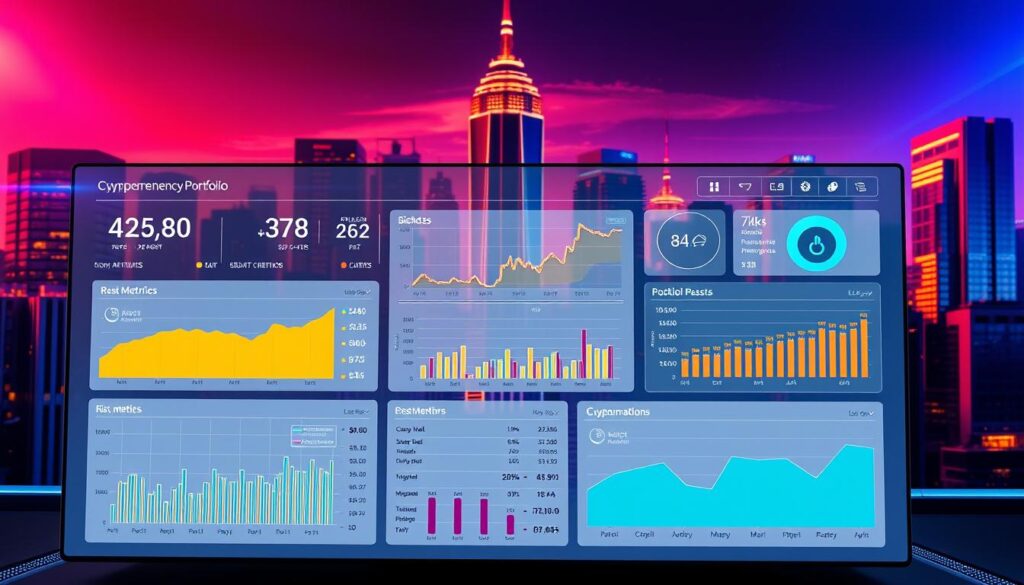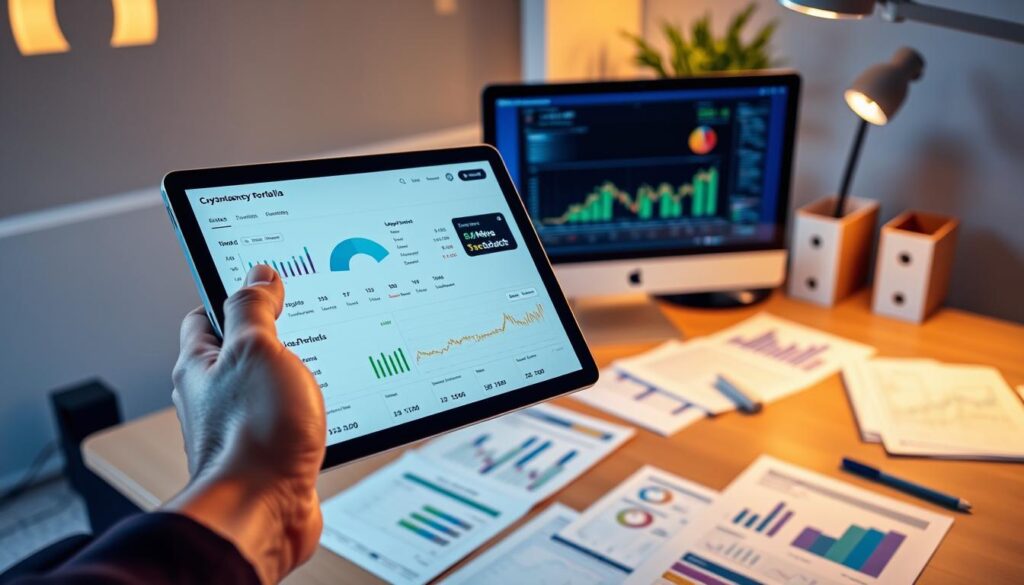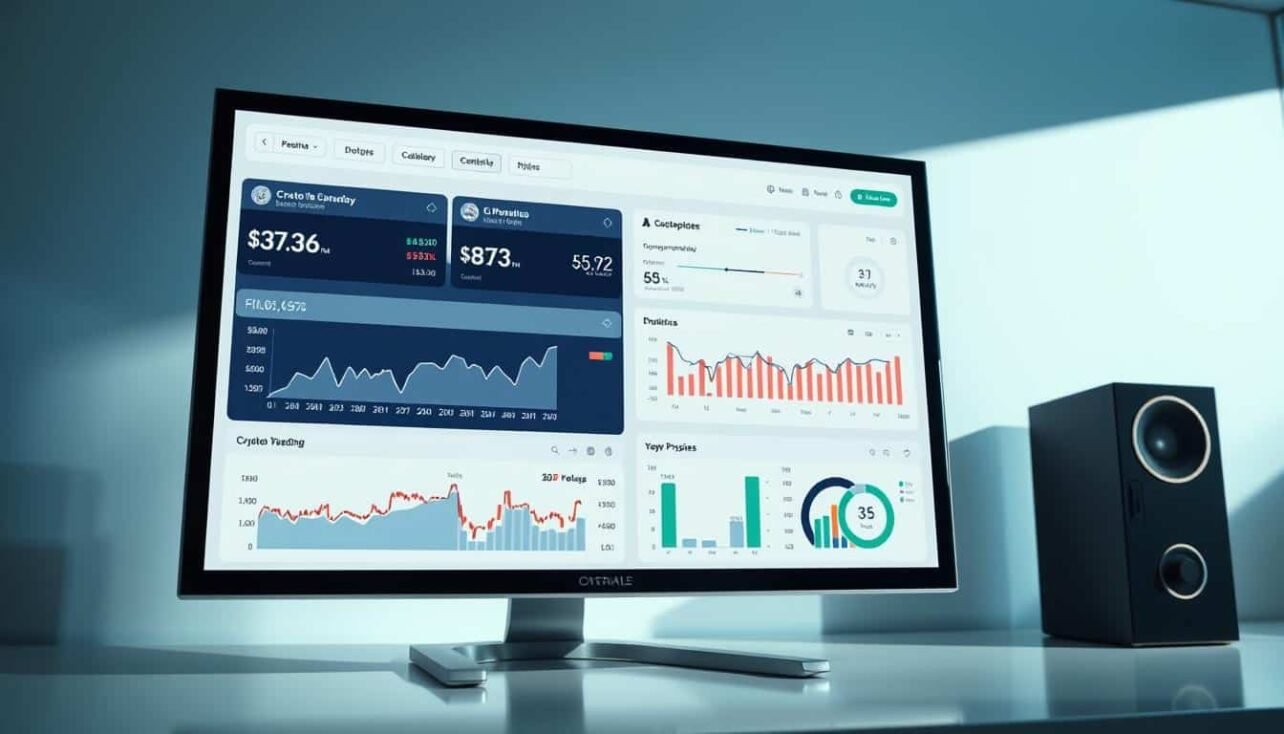The landscape for digital assets in 2025 moves at an incredible pace. Thousands of tokens and constant price swings create a highly unpredictable environment. Manual tracking methods, like spreadsheets, are no longer sufficient for making timely decisions.
This complexity has driven the evolution from basic tracking to sophisticated analysis platforms. These modern systems leverage powerful technologies to process vast amounts of information. They provide a deeper understanding of market sentiment and potential trends.
These platforms address a critical challenge for investors. They help make sense of the overwhelming data and non-stop trading cycles. The best part is that many offer robust features without a subscription, making professional-grade insights accessible to everyone.
This guide will explore the leading options available today. You will learn how to select a platform that fits your specific needs and enhances your strategic approach.
Main Points to Remember
- The digital asset market in 2025 is defined by high speed and data intensity.
- Manual tracking methods are inadequate for today’s complex investment environment.
- Modern analysis tools process vast data sets to uncover market insights.
- The primary goal is to support informed decision-making amid volatility.
- Many powerful platforms provide significant value at no cost to users.
- Understanding key features is essential for selecting the right tool.
- This guide provides a practical framework for evaluation and selection.
Navigating the Evolving Crypto Landscape with AI Tools
Market dynamics in 2025 are defined by their breakneck speed and the sheer volume of data generated every second. This environment makes traditional analysis methods nearly obsolete.
Successful navigation now depends on understanding these core shifts and the technologies built to manage them.
Understanding Market Volatility and Trends
Price movements of ten to twenty percent within a day are no longer exceptional events. They reflect the new normal.
Social media narratives and major whale transactions can pivot market trends in hours. This pace overwhelms manual tracking.
Thousands of new tokens enter the scene monthly. It is impossible for individual investors to research every opportunity thoroughly without advanced assistance.
The Role of Emerging Technologies
Modern systems utilize machine learning to scan millions of social media posts for sentiment shifts. They identify patterns that human eyes would miss.
Natural language processing decodes news and announcements for immediate impact assessment. Blockchain analytics monitor on-chain activity for early signals.
These technologies transform vast data into actionable insights. They have become essential for making informed decisions in a competitive landscape.
What was once a luxury for large institutions is now accessible to all market participants through powerful, cost-effective platforms.
Understanding AI-Powered Crypto Analysis
Today’s investment landscape requires processing capabilities that go far beyond traditional analytical approaches. Modern platforms leverage sophisticated technologies to deliver comprehensive market evaluation.
These systems transform raw information into actionable intelligence. They scan multiple data sources simultaneously to build a complete picture.
How Machine Learning Enhances Trading Decisions
Machine learning algorithms identify patterns across historical market movements. They detect subtle correlations that human analysis might overlook.
These systems continuously improve their accuracy as they process new information. This adaptive approach provides significant advantages over static rule-based methods.
Advanced platforms combine on-chain metrics with social sentiment and news analysis. This multi-source approach creates robust predictive models.
The best tools explain their methodology clearly rather than offering mysterious predictions. This transparency helps users understand the reasoning behind each recommendation.
Machine learning removes emotional bias from the evaluation process. It processes millions of data points to support informed investment decisions.
The Rise of AI Crypto Analytics in 2025
A significant transformation has reshaped how investors approach the dynamic world of digital currencies. Analytical platforms have evolved from specialized instruments for quantitative traders into essential resources for a broad audience.
This shift to the mainstream is driven by several powerful forces. The exponential growth of available market information is a primary factor. Investors now demand more sophisticated insights to navigate the complex environment.
Three key elements fueled widespread adoption this year:
- Data proliferation: The sheer volume of on-chain, social, and news data became unmanageable manually.
- Investor sophistication: Retail participants now expect professional-grade evaluation tools.
- Technology democratization: Cloud computing and open-source frameworks made powerful analytics affordable.
The 2024-2025 period was a definitive turning point. Free versions of these platforms transitioned from having limited functionality to offering genuinely useful capabilities. Fierce competition among service providers pushed this innovation, as they vied for user attention in a crowded field.
This convergence of factors has established the current period as a high point for accessible, powerful investment analysis. These advancements have fundamentally changed investor expectations, making deep analytical insights a standard requirement rather than a luxury.
Key Features of Top Free AI Crypto Portfolio Analyzers
Evaluating the capabilities of modern digital asset platforms requires a clear understanding of their core functionalities. Not all analytical systems are created equal. Some specialize in deep on-chain transaction data, while others excel at gauging social sentiment or technical forecasting.

Intelligent Market Insights
Truly valuable analysis goes beyond simple automated reports. Look for systems with pattern recognition that identifies recurring market behaviors. Anomaly detection is another critical feature, flagging unusual activity that might signal a major shift.
Predictive modeling should come with transparent confidence levels. The best tools provide contextual explanations for their conclusions. This helps you understand the reasoning behind each insight.
A major advantage is the integration of multiple data sources. Combining on-chain metrics with social and news analysis creates a much more robust picture for users.
Ease of Use and Seamless Integrations
Powerful features mean little if a platform is difficult to navigate. An intuitive interface is essential. It should not require deep technical expertise to operate effectively.
Seamless connections with major exchanges and wallets save hours of manual data entry. Real-time synchronization ensures your portfolio data is always accurate. Mobile access allows for on-the-go monitoring, a must in fast-moving markets.
Customizable dashboards let you focus on the metrics that matter most to your strategy. These usability features are just as important as the analytical tools themselves.
Exploring the “AI crypto portfolio analyzer free personalized report generator”
Customized market evaluation represents the next frontier in digital asset management technology. These advanced systems create tailored documentation that adapts to individual investment strategies and specific asset compositions.
Unlike basic tracking tools that simply display numbers, these platforms provide narrative explanations and actionable recommendations. They consider your unique risk tolerance and investment timeline to deliver context-specific guidance.
True personalization means the analysis reflects your actual holdings and stated objectives. The system synthesizes data from multiple sources to identify patterns relevant to your specific situation. This approach generates human-readable explanations rather than generic market commentary.
Platforms like Powerdrill Bloom demonstrate this capability through natural language interfaces. Users can ask specific questions about their holdings and receive instant, detailed answers with visual charts and anomaly detection.
The practical benefits include significant time savings on research and uncovering hidden risks in your asset allocation. These tools also help identify optimization opportunities and provide documentation for decision-making processes.
Free versions typically have usage limits on queries and historical data access. To maximize value, focus your questions on high-impact areas and schedule regular reviews of your investment strategy.
In-Depth Look at On-Chain and Off-Chain Data Integration
Understanding the two primary types of data available provides a significant advantage in digital asset evaluation. A complete view requires combining both on-chain and off-chain sources.
On-chain data refers to information permanently recorded on a blockchain. This includes transaction volumes, wallet address activity, and token movements. It represents verified economic activity, forming a fundamental layer for analysis.
In contrast, off-chain data exists outside the blockchain. This encompasses social media chatter, news headlines, and developer updates. These external factors often drive market sentiment and short-term price tracking.

Platforms like Sentora excel by merging these data streams. They correlate social hype with real on-chain transactions. For example, positive sentiment aligning with large wallet accumulation is a strong bullish signal.
This integration is technically complex. Data arrives at different speeds and in various formats. Powerful systems must process millions of data points to find meaningful correlations for your portfolio.
When evaluating a tool, ask how it combines these sources. Look for clear explanations of how on-chain metrics and off-chain narratives interact. This balanced approach delivers the most reliable insights.
Leveraging Machine Learning and Sentiment Analysis
Market sentiment analysis has evolved from basic keyword counting to nuanced contextual understanding. Modern platforms now process vast amounts of unstructured social data to generate actionable trading insights.
These systems use sophisticated algorithms that recognize patterns between sentiment shifts and price movements. They are trained on historical data to identify meaningful correlations.
Tracking Social Media and News Trends
Advanced tools monitor platforms like Twitter, Reddit, and Telegram simultaneously. They detect emerging narratives before they reach mainstream awareness.
Platforms like Santiment and LunarCrush demonstrate different approaches to sentiment scoring. Santiment focuses on social volume and developer activity, while LunarCrush tracks engagement metrics and influencer impact.
These systems can identify sentiment divergences between communities and coordinated promotion campaigns. However, reliability challenges exist, including bot activity and manipulation attempts.
Investors should use sentiment signals as confirming indicators rather than primary decision drivers. Always combine them with fundamental analysis for balanced market insights.
Narrative-driven strategies have become increasingly important where stories often matter more than traditional valuation metrics. Understanding these dynamics provides a significant edge in today’s trading environment.
User Experience and Ease of Use in Portfolio Analyzers
The usability of a digital asset management system directly impacts its effectiveness for investors. Even powerful analytical features become worthless if the interface confuses users. The best platform balances sophisticated capabilities with straightforward navigation.
![]()
Customizable Dashboards for Beginners and Experts
Modern systems offer highly adaptable interfaces that serve different experience levels. Beginners benefit from simplified views that hide complex metrics. This reduces overwhelm while learning the basics of asset tracking.
Advanced users can create detailed dashboards showing preferred data points. Widget arrangements, color schemes, and layout templates accommodate various strategies. This customization ensures each investor sees their most relevant portfolio information.
Mobile Access and Real-Time Alerts
Constant market movement demands on-the-go access. Mobile applications enable tracking from anywhere at any time. Responsive designs work seamlessly across different screen sizes.
Real-time alerts notify users about price changes, volume spikes, and news developments. Customizable notification settings prevent information overload. Effective alerts help investors act quickly during critical market time.
These usability features directly influence investment outcomes. A well-designed platform encourages regular engagement with your portfolio. Easy access and timely alerts help both beginners and experts make better decisions.
Comparing Top Free AI Crypto Analyst Tools
Selecting the right analytical system requires a direct comparison of the leading options available to investors. Each platform offers a unique blend of features tailored to different styles and goals.
Understanding these distinctions helps you find the best fit for your specific needs.
Strengths and Limitations of Leading Platforms
No single tool is perfect for every situation. The ideal choice depends on your primary focus, whether it’s on-chain data, social sentiment, or technical charting.
Each system has specific areas where it excels, along with inherent constraints.
| Platform | Primary Strength | Ideal For | Free Tier Limitation |
|---|---|---|---|
| Powerdrill Bloom | Natural language queries | Quick, exploratory analysis | Limited query history |
| IntoTheBlock | On-chain metrics & signals | Fundamentals-focused trading | Basic market metrics |
| TradingView | Community AI scripts | Chart-technical users | Script usage limits |
| Santiment | Narrative & developer tracking | Story-driven market analysis | Restricted data access |
| LunarCrush | Social hype analytics | Spotting emerging tokens | Basic sentiment scores |
| Superalgos | Open-source flexibility | Developers building custom tools | Steep technical learning curve |
For instance, Powerdrill Bloom makes complex data exploration simple for all users. Meanwhile, open-source platforms like Superalgos offer ultimate control for those with technical skills.
When evaluating these tools, consider how they integrate with your existing workflow. A great platform should enhance your decision-making process for your digital asset portfolio. You can explore more advanced trading platform options for additional features.
The key is to match the tool’s core competency with your investment strategy. This ensures you get the most relevant insights for managing your holdings.
Leveraging Personalized Reports for Smarter Investment Decisions
Tailored analysis bridges the gap between complex market information and practical decision-making. Unlike generic market summaries, these documents consider your specific asset mix and financial objectives.
Quality documentation typically includes several key components. These cover composition breakdowns, performance attribution, and correlation assessments. Forward-looking suggestions complete the picture.
Tailored Recommendations and Insights
Sophisticated systems generate suggestions that account for multiple factors simultaneously. They evaluate current holdings against stated goals and risk parameters. This creates context-specific guidance rather than generic advice.
These tools can surface valuable insights that might otherwise remain hidden. Examples include over-concentration in specific sectors or holdings that no longer align with your strategy. Rebalancing opportunities and tax considerations also receive attention.
When evaluating recommendations, consider their specificity and transparency. Actionable advice with clear reasoning provides more value than vague suggestions. The best insights come with explanations that help you understand the underlying analysis.
Incorporating these documents into regular review cycles enhances your overall approach. They serve as documented rationale for your choices and help maintain discipline during market fluctuations.
Advanced Analytics, Alerts, and Trade Execution Strategies
Sophisticated investment platforms now offer capabilities that move beyond simple monitoring. These advanced tools provide deep insights into market behavior and investment performance.
Professional-grade systems include features like backtesting and Monte Carlo simulations. These analytics help validate trading strategies before committing capital. Factor analysis identifies what truly drives your returns.
Real-Time Data Tracking
Market movements demand current information for timely decisions. Real-time tracking ensures prices refresh every 15 seconds during active hours.
This data freshness is crucial in volatile markets where conditions change rapidly. The best platforms maintain robust infrastructure to support continuous updates.
Automated Rebalancing Features
Maintaining target allocations becomes effortless with automation. These features adjust holdings based on predefined parameters and thresholds.
Automation removes emotional bias from rebalancing decisions. It helps optimize performance while effectively managing risk over time.
These advanced capabilities distinguish professional tools from basic tracking systems. They empower investors with sophisticated analytics and execution strategies.
Integrating Conventional Portfolio Management with Crypto Tools
Modern investors increasingly hold a mix of traditional and digital assets. This creates a need for unified management solutions. Using separate systems for stocks and newer holdings creates significant blind spots.
Siloed tracking can lead to overlooked correlation risks. It also results in an inaccurate view of total allocation. A complete risk assessment becomes difficult without a single, consolidated picture.

Platforms like Mezzi, Kubera, and Personal Capital address this challenge. They connect with thousands of financial institutions. This brings together stocks, ETFs, real estate, and digital currencies into one view.
This integration provides a true picture of your net worth. It allows for proper diversification assessment across all your holdings. You gain insights that single-asset-class tools cannot provide.
The table below compares key features of these unified tracking platforms:
| Platform | Asset Coverage | Primary Strength | Best For |
|---|---|---|---|
| Mezzi | Stocks, ETFs, Real Estate, Digital Currencies | Broad institutional connections | Investors with diverse, traditional-heavy assets |
| Kubera | Traditional & Alternative Assets, NFTs, Collectibles | Comprehensive wealth tracking | Those with complex, alternative holdings |
| Personal Capital | Stocks, Bonds, ETFs, Mutual Funds, Real Estate | Blends conventional management with advanced analytics | Investors seeking a balanced, analytical approach |
These systems help investors make more informed decisions. They offer a complete financial picture for better strategic investment planning.
Market Trends and Real-Time Data for Informed Trading
Modern trading platforms deliver information updates every 15 seconds during active hours. This speed has become essential where significant price shifts can occur within minutes.
Delayed data can lead to missed opportunities or unexpected losses. Tools now combine technical charts with fundamental metrics and news feeds.
Analyzing Price Movements and Volatility
Sophisticated systems distinguish meaningful trends from random market noise. They use volume confirmation and multi-timeframe analysis for accuracy.
These tools identify support and resistance levels automatically. They also monitor liquidity changes across different exchanges.
Volatility analysis includes historical patterns and current regime assessment. Understanding these cycles helps traders time entries during calm periods.
Practical applications include spotting breakout opportunities and trend reversals. The best platforms help balance responsiveness against overtrading risks.
Navigating Risk Management and Tax Optimization with AI
Two often overlooked aspects of digital asset management hold immense power to boost net returns: tax efficiency and systematic risk control. These elements work quietly in the background but significantly impact your final results.
Tax-Saving Features in Portfolio Tracking
Smart platforms automate complex tax strategies. They identify opportunities for tax-loss harvesting by scanning for underperforming assets. This process can offset capital gains, lowering your overall tax bill.
These systems track your cost basis across countless transactions. They generate detailed reports compatible with popular tax software. This saves hours of manual work during tax season.
For investors, these features are crucial. High fees can eat into returns, making tax efficiency essential. Proper tracking ensures you keep more of your hard-earned profits.
Risk Assessment and Mitigation Strategies
Understanding your portfolio’s risk profile is fundamental. Advanced tools calculate metrics like volatility and maximum drawdown. They show how your holdings might behave during market stress.
This analysis helps investors make informed adjustments. You can optimize diversification and position sizing. The goal is to achieve better risk-adjusted performance.
Effective risk management protects your capital during downturns. It is a vital component for long-term success. Combining it with tax strategy creates a powerful approach for all types of portfolios.
Choosing the Best Tool for Your Crypto Portfolio
Finding the right analytical platform requires matching its strengths to your specific investment style. There is no single “best” option that works for everyone. Your ideal choice depends on your strategy, technical skill, and information needs.
Begin by clearly defining your primary approach. Are you a long-term holder, an active trader, or driven by market narratives? Each style benefits from different capabilities within these platforms.
Sophisticated market participants often blend signals from multiple sources. They might use one tool for exploration and another for on-chain confirmation. This multi-tool strategy provides a more balanced perspective.
When evaluating options, start with complimentary plans to test functionality. Upgrade to a paid subscription only if a tool consistently improves your decision-making. Consider the time required to learn each system and the quality of its mobile access.
Commit to a trial period with your selected tools. Track which insights you actually use to influence your investment decisions. This practical test is the ultimate way to choose the right fit for your holdings.
Conclusion
As we conclude this comprehensive guide, the central message is clear: strategic tool selection is paramount for success. Modern analytical platforms have evolved from luxury items to essential resources for today’s investors.
The best approach combines complementary tools rather than relying on a single solution. Exploratory analysis, on-chain tracking, and sentiment monitoring each provide unique insights. This multi-tool strategy offers the most comprehensive view of your digital asset portfolio.
Your immediate action plan should focus on practical testing. Select two or three platforms that align with your investment strategies. Commit to a 30-60 day evaluation period to determine which insights genuinely improve your decision-making.
The learning curve is real, but the payoff is substantial. Start exploring these tools today to develop the skills needed for effective portfolio management in our fast-moving market environment.
FAQ
What exactly does a free portfolio analyzer do?
These tools provide a comprehensive overview of your digital asset holdings. They track performance, calculate profit and loss, and integrate market data to give you a clear picture of your investment health, all without a subscription fee.
How does machine learning improve investment decisions?
Machine learning algorithms process vast amounts of market data, including price history and social sentiment. This helps identify subtle patterns and trends that might be difficult to spot manually, offering data-driven insights for your strategies.
Are these platforms suitable for beginners?
Absolutely. Many top platforms prioritize ease of use with intuitive dashboards and clear visualizations. They often include educational resources to help new investors understand key metrics and market movements effectively.
What kind of personalized reports can I generate?
You can create detailed reports on your asset allocation, historical performance, and potential risk exposure. These tailored insights help you understand your portfolio’s strengths and weaknesses for smarter planning.
Do these analyzers offer real-time alerts?
Yes, a key feature is the ability to set custom alerts for price changes, volume spikes, or other significant market events. This ensures you stay informed and can react promptly to market conditions.
Can I connect my exchange accounts securely?
Reputable tools use secure API integrations, often with read-only access. This allows the platform to sync your transaction history and current balances without the ability to execute trades or withdraw funds, ensuring safety.
What advanced analytics are typically available?
Beyond basic tracking, you might find analytics for volatility, correlation between assets, and liquidity metrics. Some tools also offer backtesting capabilities to evaluate how your strategies would have performed historically.
How do these tools assist with tax optimization?
Many platforms include features that help calculate capital gains and losses based on your transaction history. This can simplify tax reporting by generating summaries of your yearly trading activity.


No comments yet